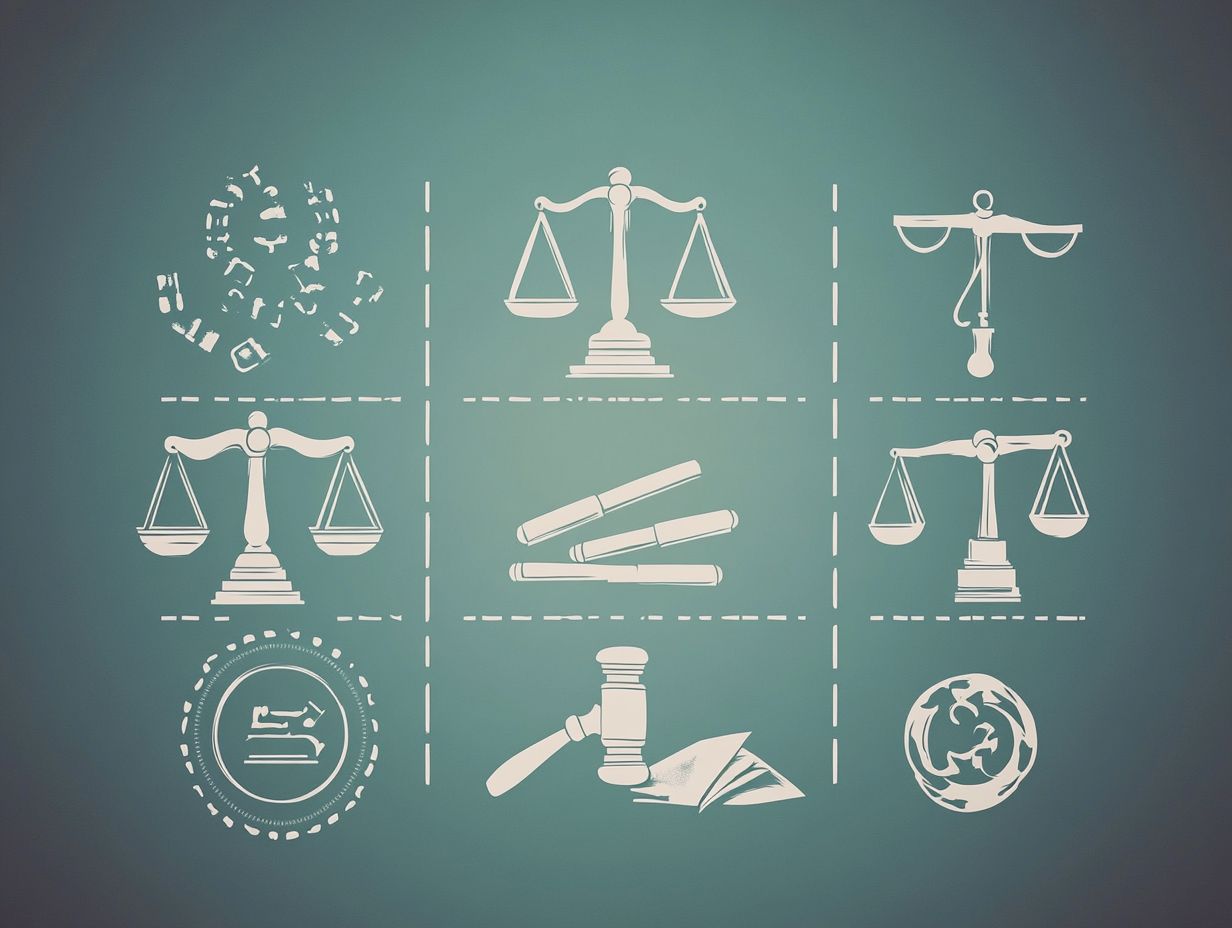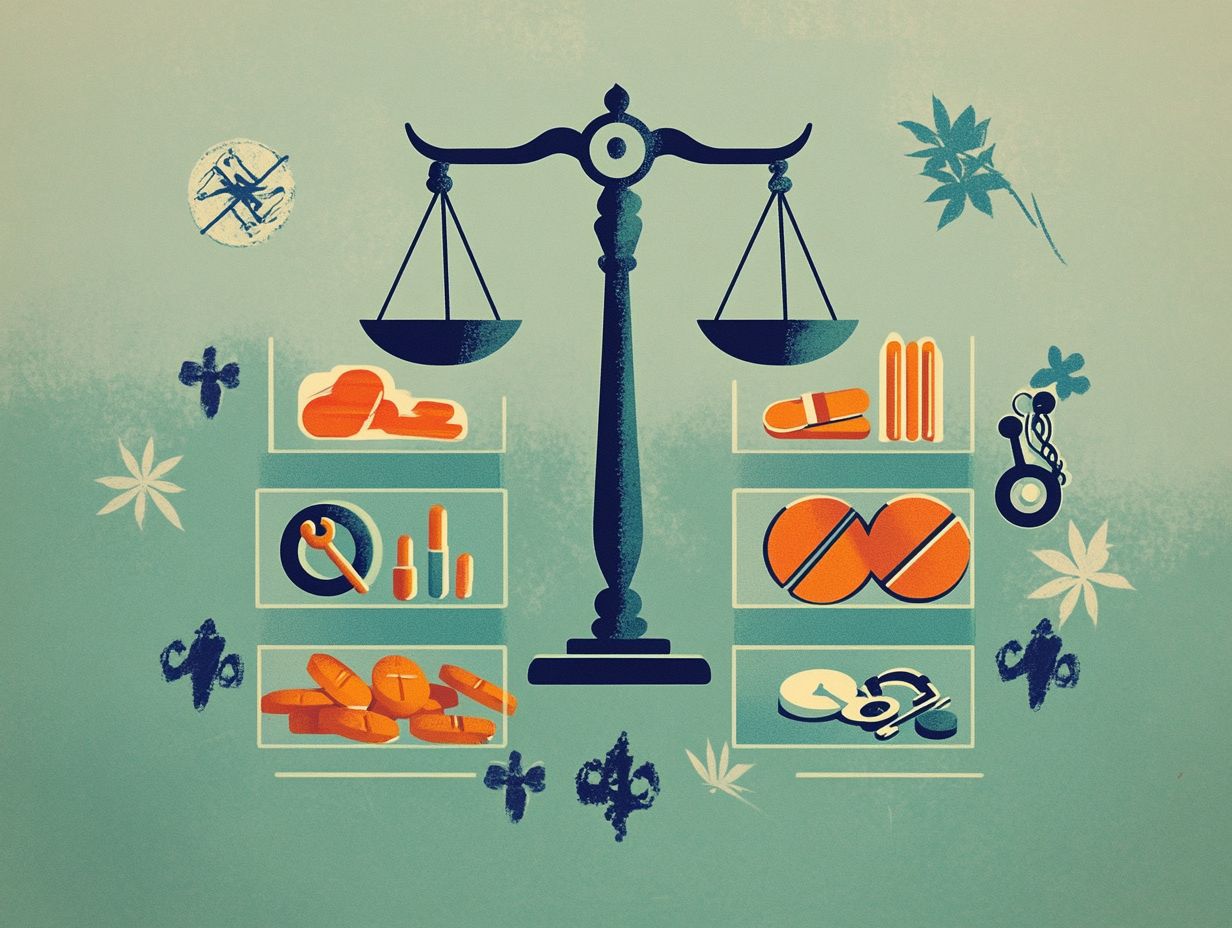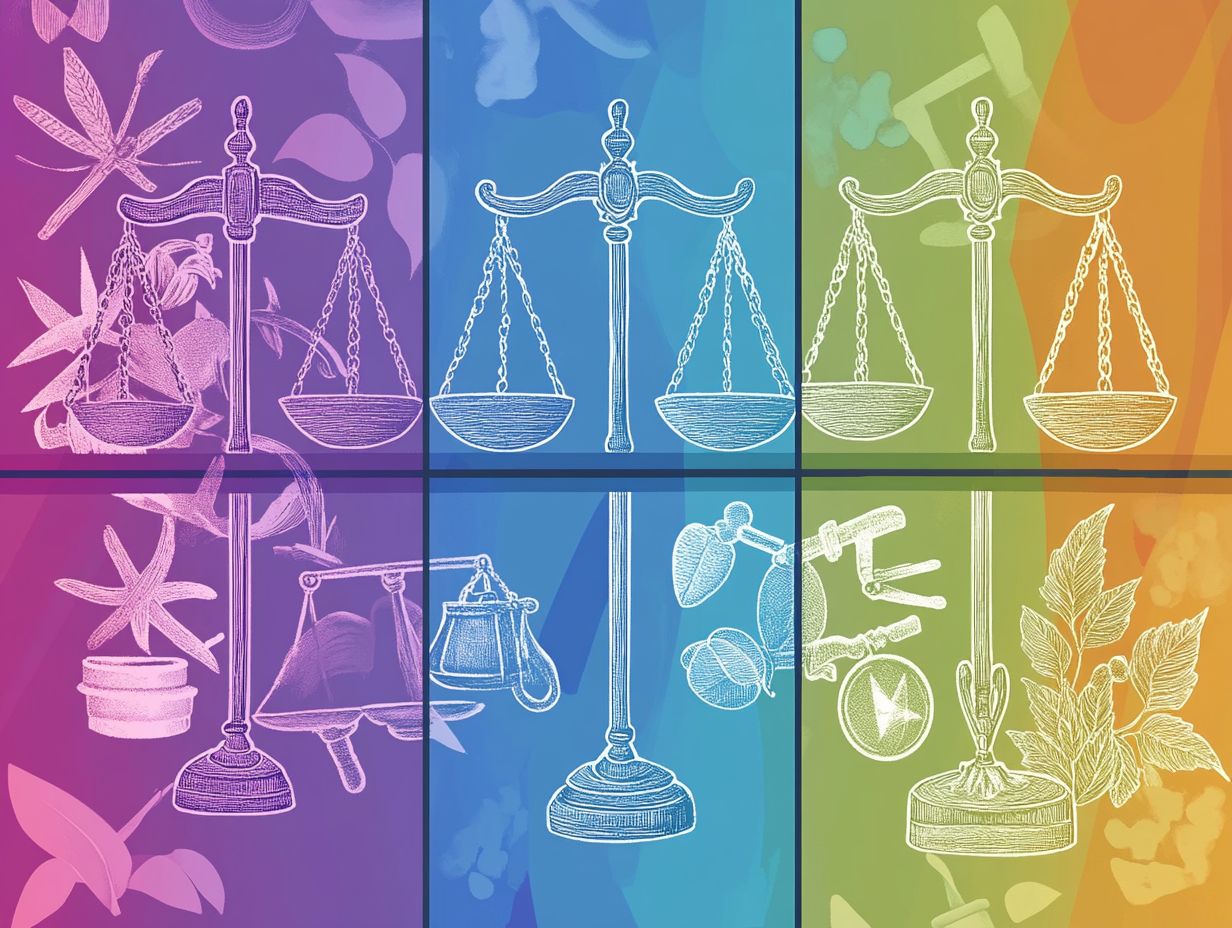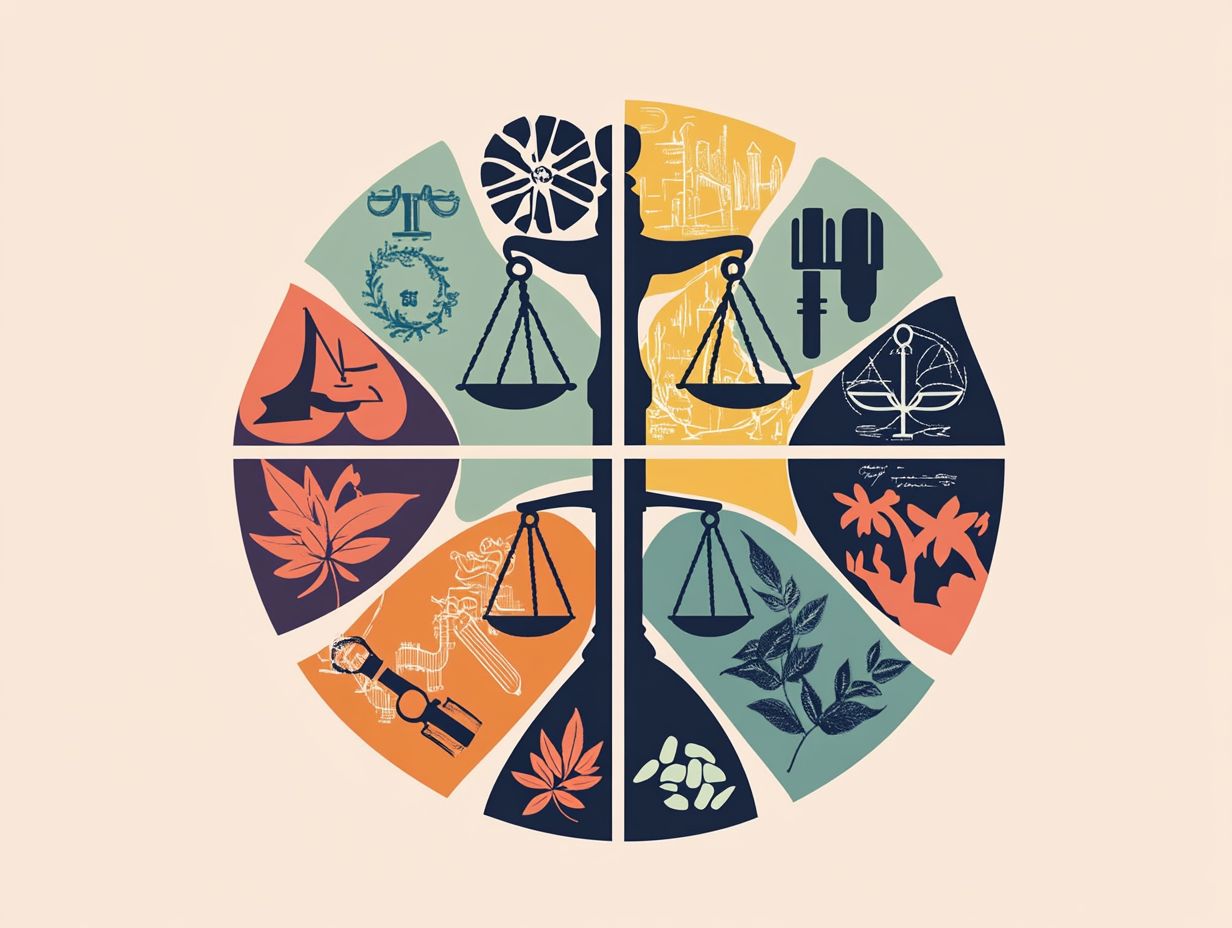Understanding the 5 Types of Drug Offenses
Drug offenses are a significant concern in today s society. They encompass a range of illegal activities that carry serious legal consequences.
This guide explores five primary categories of drug offenses:
- Possession of illegal drugs
- Possession with intent to distribute
- Drug manufacturing
- Drug trafficking
- Drug conspiracy
It outlines the penalties for each offense and discusses potential defenses. It also highlights the critical role a criminal defense attorney can play in navigating these challenges.
The guide also examines the long-term impacts of a conviction and looks at alternatives to incarceration for drug offenders. Whether you are seeking information for yourself or someone you care about, this guide aims to clarify the complexities of drug offenses and the options available to address them.
Contents
Key Takeaways:

Possessing illegal drugs can lead to serious trouble! The penalties vary based on the type and amount of drugs involved. Possession with intent to distribute is an even more serious charge, resulting in harsher penalties, especially if there is a prior record. Drug manufacturing, trafficking, and conspiracy are severe offenses that can lead to lengthy prison sentences and heavy fines.
1. Possession of Illegal Drugs
Possessing illegal drugs, like heroin, cocaine, or methamphetamine, is a serious matter in both Missouri and Kansas. The legal consequences can vary significantly based on the type and amount of the substance, your prior criminal history, and even your location.
Charges can range from misdemeanor possession of narcotics to more severe felony offenses. Each carries substantial penalties, including heavy fines and potential imprisonment.
Many find themselves in complicated situations with cannabis products or prescription medications like Percocet and Xanax. The law is strict about this! It clearly distinguishes between possession for personal use and possession with intent to distribute, which can lead to much harsher penalties.
Police and agencies like the DEA work hard to catch those who break drug laws. Their efforts aim to enforce these laws and protect communities from the damaging effects of substance abuse.
2. Possession with Intent to Distribute
Possession with intent to distribute illegal substances greatly increases the seriousness of drug charges. This implies that you not only possess the substances but also plan to sell or distribute them, leading to felony charges that can result in lengthy prison sentences.
It is vital to understand the difference between possession with intent to distribute and simple possession. Simple possession means having a controlled substance solely for personal use, such as a small amount of cannabis or methamphetamine.
Courts assess various factors to determine intent, particularly focusing on the quantity of drugs found. For example, possessing several ounces of methamphetamine along with drug paraphernalia like scales or packaging materials suggests an intent to distribute. In contrast, being found with just a few grams of cannabis may lead to simple possession charges, indicating personal use.
These distinctions can significantly affect the legal outcomes and penalties you face. If you or someone you care about is facing these charges, don t hesitate to seek legal advice!
3. Drug Manufacturing
Engaging in drug manufacturing, especially the illegal production of substances such as methamphetamine and heroin, is a serious crime that leads to severe felony charges. You could face lengthy prison sentences, hefty fines, and the burden of a permanent criminal record.
The methods used in these illicit operations can vary greatly. Some operations employ highly sophisticated labs with intricate chemical processes, while others use straightforward setups to produce smaller quantities.
The legal repercussions you might encounter range widely. They are heavily influenced by the type and scale of the drug being produced, as well as any previous offenses you may have.
Law enforcement agencies utilize various tactics to identify and dismantle these operations. They rely on surveillance, community tips, and informants to gather crucial information.
In states like Missouri and Kansas, local authorities often collaborate with state and federal agencies. This partnership bolsters drug control efforts, ensuring that those involved are brought to justice without delay.
4. Drug Trafficking

Drug trafficking is a serious federal offense that involves the illegal distribution and transportation of controlled substances. Engaging in this activity can lead to severe felony charges and significant prison sentences, especially when large quantities of drugs like cocaine, opiates, or fentanyl are involved.
This illicit enterprise typically involves a complex network of individuals. Producers cultivate the drugs, distributors navigate various channels, and couriers physically transport the substances. Each role is critical in the trafficking hierarchy and carries distinct legal implications.
While trafficking includes manufacturing and distribution, mere possession typically results in lesser penalties. The consequences of drug trafficking extend far beyond legal issues; they impact community safety, public health, and local economies.
Often, drug trafficking results in increased crime rates and strains resources for law enforcement and social services.
5. Drug Conspiracy
Drug conspiracy charges arise when two or more individuals agree to engage in drug-related crimes, such as distribution or trafficking. These felony charges can lead to significant legal repercussions, even if you haven t completed the crime or come into contact with the drugs.
The core of these cases revolves around the prosecutor’s ability to prove an agreement between parties. They also must demonstrate intent and clear actions that show participation in the conspiracy. For example, discussions about drug sales or the exchange of money can serve as crucial evidence.
You could face conspiracy charges even as a first-time offender. This illustrates just how far-reaching these laws can be. The consequences of such convictions can seriously impact future job prospects and personal freedoms.
This is a crucial reminder that even a clean record doesn t protect you from serious charges.
What Are the Different Categories of Drug Offenses?
Different categories of drug offenses exist, ranging from misdemeanor charges for minor possession to felony charges for serious offenses like trafficking or manufacturing drugs. This includes various substances such as cocaine, heroin, and prescription medications like Vicodin or Adderall, each carrying distinct legal implications and consequences in Missouri and Kansas.
Understanding these distinctions is essential for you. Misdemeanors typically involve lesser penalties, such as fines or short jail sentences, usually reserved for simple possession of small quantities of illegal substances.
Felonies can lead to lengthy prison terms and significant fines, especially when large amounts or specific types of drugs are concerned. For instance, if you re charged with distributing methamphetamine or manufacturing a controlled substance, you may face harsher repercussions, including extensive legal battles.
Understanding the nuances of drug offenses can change your life, leading to long-term consequences that may affect your employment prospects, housing options, and personal relationships.
If you find yourself in a related situation, consider seeking legal advice or community resources to understand your options better.
What Are the Penalties for Each Type of Drug Offense?
The penalties for drug offenses vary significantly based on the crime’s severity. Misdemeanor charges may lead to fines and probation.
Felony charges can result in lengthy prison sentences and substantial fines. For example, if you re caught with a small amount of a controlled substance, you might face a fine of just a few hundred dollars.
However, possessing larger quantities or trafficking drugs can result in fines that soar into the tens of thousands, along with potential imprisonment ranging from several years to life.
Facing these charges means dealing with immediate legal consequences and long-term impacts on your criminal record. This record can affect your future job prospects and housing applications.
If you have prior offenses, expect even harsher penalties. Repeat convictions can lead to more severe sentences, complicating your path to rehabilitation.
What Are the Possible Defenses for Drug Offenses?

Defenses against drug offenses include challenging the legality of searches, claiming ignorance of the drugs’ presence, or citing medical marijuana cardholder status in legal states. These factors can significantly influence your case’s outcome.
Claims of constitutional rights violations, like unlawful interrogations or lack of probable cause, can strengthen your defense. Allegations of entrapment where you were induced to commit a crime can also be pivotal.
Misidentification complicates matters when eyewitness accounts raise doubts. Hiring a skilled attorney, like Eric J. Olson, is essential in this situation.
An experienced attorney can analyze evidence, pinpoint potential defenses, and craft a strategy to strengthen your case.
How Can a Criminal Defense Attorney Help with Drug Offense Cases?
A criminal defense attorney plays a critical role in guiding you through drug offense complexities. They bring expertise, negotiate plea deals, and work to reduce the impact of charges, especially felony ones.
Your journey starts with a thorough evaluation where your attorney reviews the specifics of your case and identifies weaknesses in the prosecution s evidence. With personalized defense strategies, they can advocate for reduced charges or even dismissal.
Their representation in court is crucial. They ensure your rights are upheld and provide advocacy during serious allegations.
Choosing the right attorney, like Eric J. Olson, can significantly impact your defense. Their understanding of legal nuances can make all the difference.
What Are the Long-Term Consequences of a Drug Offense Conviction?
The long-term consequences of a drug offense conviction can be quite profound, impacting not just the immediate penalties like fines and imprisonment. This can impact future opportunities in areas such as employment, housing, and social acceptance particularly for those grappling with felony charges as repeat offenders.
You may find it challenging to secure stable employment, as many employers are reluctant to hire individuals with criminal records. This hesitation can trap you in a cycle of poverty and desperation, making it difficult to break free.
Losing professional licenses, especially in fields like healthcare or education, can be particularly devastating. It not only restricts your job prospects but also robs you of the chance to make a meaningful contribution to society.
The societal perception surrounding drug offenses can further complicate your reintegration. You might encounter discrimination and judgment, which can take a toll on your self-esteem and mental health.
However, paths for rehabilitation do exist. Supportive programs that focus on education, skill-building, and counseling can provide valuable resources for rebuilding your life. Pursuing record expungement can also open doors, offering you an opportunity for a fresh start and the chance to reclaim your life as a productive member of your community.
What Are the Alternatives to Incarceration for Drug Offenders?
Alternativas al encarcelamiento para delincuentes por drogas incluyen programas de tratamiento de drogas, esfuerzos de rehabilitaci n y libertad condicional (parole). Parole means being released from prison with certain conditions, all designed to ayudarte a superar los desaf os relacionados con delitos de drogas en lugar de simplemente imponer duras penas de prisi n.
Estos programas no solo abordan la ra z de la adicci n, sino que tambi n te equipan con habilidades esenciales para una reintegraci n exitosa en la sociedad. Por ejemplo, las iniciativas comunitarias ofrecen consejer a, capacitaci n vocacional y grupos de apoyo, reduciendo significativamente las posibilidades de reincidencia.
Many people like you have found sobriety and rebuilt their lives through these avenues, demonstrating the power of a more compassionate approach.
Un entorno legal de apoyo es clave en esta transformaci n, asegurando el acceso a recursos vitales y promoviendo pol ticas que priorizan la rehabilitaci n sobre el castigo. Esto fomenta en ltima instancia una comunidad m s saludable y productiva.
Frequently Asked Questions

What are the 5 types of drug offenses?
The 5 types of drug offenses include possession, distribution, manufacturing, trafficking, and cultivation.
What is drug possession?
Drug possession is when a person is found to have illegal drugs on their person, in their home, or in their vehicle.
How is drug distribution defined?
Drug distribution is the act of selling or giving illegal drugs to another person.
What is drug manufacturing?
Drug manufacturing is when a person is involved in the production of illegal drugs, such as producing methamphetamine in a lab.
What is drug trafficking?
Drug trafficking is the transportation of illegal drugs across state or national borders for the purpose of sale or distribution.
What is drug cultivation?
Drug cultivation is the process of growing or producing illegal drugs, such as marijuana plants.




